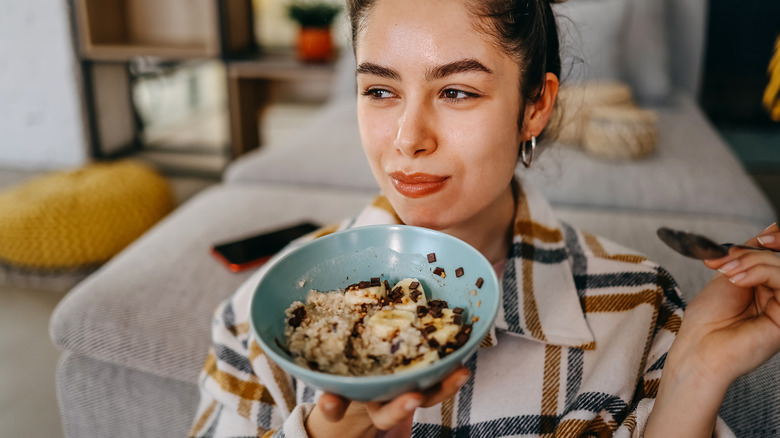When it comes to getting a good night’s sleep, people often tell you to avoid things like caffeine and alcohol. While the former will keep you up at night, the latter will initially lull you to sleep because of its sedative properties but ultimately disrupt your sleep cycle.
Moving away from what you shouldn’t be consuming before bedtime, there’s also some science to prove the benefits of eating certain kinds of foods to improve sleep quality, one of which is the humble morning meal contender: oatmeal. Per sleep experts and registered nutritionists, oatmeal essentially has two sleep-friendly ingredients — melatonin and magnesium — in addition to being a fiber-rich whole grain food that supports heart health. Plus, oats contain carbohydrates that help the amino acid tryptophan reach your brain, which in turn aids serotonin production that aids sleep, according to Psychology Today.
“Grains in oatmeal trigger insulin production much like whole-grain bread. They raise your blood sugar naturally and make you feel sleepy. Oats are also rich in melatonin, which relaxes the body and helps you fall asleep,” shared nutritionist Cynthia Pasquella, CCN, CHLC, CWC with Good Housekeeping. Your body typically produces enough melatonin to aid sleep but for those experiencing insomnia or other sleep struggles, supplementing with melatonin can help. According to licensed registered dietitian Lauren Manaker (per Well+Good), there are things you could be adding to your oatmeal to boost melatonin.
Oatmeal with nuts and bananas are great for sleep

Nuts (e.g., pistachios, almonds, and walnuts) and fruits (like bananas and certain berries) contain melatonin, too, so they make good additions to a nighttime oatmeal snack. But be careful with just how much added sugar you’re consuming with your oatmeal because this can disrupt sleep quality, shared Manaker with Well+Good. “Just be sure not to add too much sugar — or any sugar — to your oats before bedtime,” she said.
The magnesium in this heart-healthy food works by relaxing your central nervous system, notes Sleep Foundation. Magnesium is “widely available in both plant and animal foods such as dairy products, leafy greens, nuts, legumes and whole grains,” shared integrative medicine specialist Dr. Naoki Umeda (via Cleveland Clinic). Now that you know a hack to try for better quality sleep, let’s look at some oatmeal recipes you can experiment with for a bedtime snack.
How to incorporate oatmeal into your nighttime routine
Off the bat, it’s good to know that there are healthy ways to eat oats and unhealthy ways to consume them. If sleep is your priority, you should be aiming for the former. Overnight oats with fruits and nuts would be a good and simple place to start.
Per registered dietitian nutritionist Patricia Bannan, there’s no need to stick to just sweet oatmeal recipes for a nighttime snack. You can switch things around and make them savory too. “Cook oats in a low-sodium vegetable broth instead of water or milk, toss in some chopped vegetables such as baby spinach, mushrooms, and onions during cooking for a nutrition boost, as well as some added flavor,” she wrote.
For those looking for simpler concoctions of this breakfast food, you can try oatmeal and almond butter, oatmeal and bananas, or cinnamon and oatmeal, explained registered dietitian Wan Na of One Pot Wellness. Almond butter contains magnesium, while bananas are a good source of both melatonin and magnesium. Cinnamon has been used throughout history as an ingredient to combat insomnia. A good night’s sleep is closely linked to proper nutrition throughout the day. If you are particularly worried about your lack of sleep each night, try the oatmeal hack and see if it works for you. Just make sure to have your snack a few hours before bedtime. You don’t want to be uncomfortably full when you’re trying to drift off to sleep.